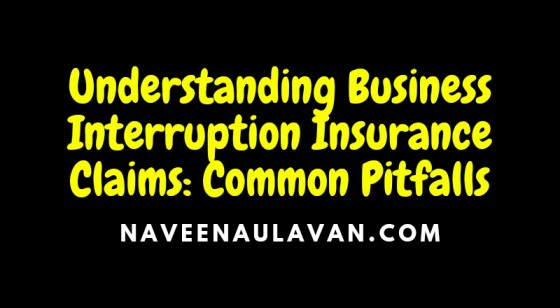Business Interruption Insurance (BII) is a crucial component of a comprehensive risk management plan for any business. It provides financial protection when unexpected events, such as natural disasters, fires, or other disruptions, lead to a temporary halt in operations. However, filing a successful business interruption insurance claim can be a complex process, and many businesses fall prey to common pitfalls that hinder their ability to obtain the compensation they deserve. In this article, we will explore the ins and outs of business interruption insurance claims, highlight the common mistakes businesses make during the claims process, and offer guidance on how to avoid them.
- Understanding Business Interruption Insurance Coverage
- Providing Accurate and Comprehensive Documentation
- Properly Calculating the Business Interruption Losses
- Mind the Waiting Periods and Coverage Triggers
- Avoiding Underinsured or Overinsured Situations
- Complying with Policy Conditions and Obligations
- Conclusion
Understanding Business Interruption Insurance Coverage
To navigate the claims process successfully, it is crucial to have a clear understanding of the scope of coverage provided by your business interruption insurance policy. BII is typically designed to compensate the insured for financial losses suffered during the period when business operations are suspended due to a covered event. This can include loss of revenue, fixed expenses, and even extra expenses incurred to minimize the interruption’s impact.
However, businesses often fail to grasp the specific conditions and limitations of their policy. For instance, some policies may only cover certain types of events, such as fires or floods, while excluding others like pandemics or acts of terrorism. Therefore, it is essential to carefully review the policy and seek professional advice if necessary to ensure that the coverage aligns with your business’s potential risks.
Providing Accurate and Comprehensive Documentation
One of the most common pitfalls during the claims process is the failure to provide accurate and comprehensive documentation of the business’s financial records. Insurers require clear evidence of the financial losses incurred during the interruption period to assess the claim accurately. This documentation may include financial statements, profit and loss statements, tax returns, and other relevant records.
Business owners must maintain meticulous records before any disruption occurs to streamline the claims process. Keeping track of all expenses, lost sales, and additional costs incurred during the interruption will help build a compelling case when filing a claim. Failure to provide comprehensive documentation can result in a delayed or denied claim, leaving the business without the much-needed financial assistance during challenging times.
Properly Calculating the Business Interruption Losses
Calculating the appropriate business interruption losses is a critical aspect of filing a successful claim. Insurers typically consider the business’s historical financial data to determine the expected revenue during the interruption period if no disruption had occurred. However, businesses often make mistakes when estimating this figure or fail to provide sufficient evidence to support their calculation.
Additionally, there can be complexities in determining the impact of the disruption on the business’s income. For instance, if a business operates seasonally, the interruption may affect peak seasons differently than off-peak periods. Moreover, businesses with fluctuating revenue streams may find it challenging to ascertain a precise baseline for lost income.
To avoid such pitfalls, it is advisable to enlist the help of financial experts who specialize in business interruption claims. These professionals can assist in accurately assessing the losses and provide credible evidence to support the calculations, strengthening the claim’s validity.
Mind the Waiting Periods and Coverage Triggers
Business interruption insurance policies often include waiting periods and specific triggers that need to be met before coverage begins. A waiting period refers to the time frame between the event causing the interruption and when the coverage actually starts. Triggers, on the other hand, are the conditions that activate the coverage.
Businesses may encounter pitfalls when they fail to comprehend the waiting periods and coverage triggers, leading to disappointment when they discover that certain losses are not covered. Additionally, it is essential to be aware of any deductible amounts that the business is responsible for before the insurance coverage kicks in.
Avoiding Underinsured or Overinsured Situations
Another common mistake made by businesses is either underinsuring or overinsuring their operations. Underinsuring can leave a business inadequately protected, exposing it to severe financial losses during an interruption. Conversely, overinsuring can lead to higher premiums, unnecessary expenses, and potential difficulties in claim settlements.
To strike the right balance, businesses must conduct periodic risk assessments to accurately determine the amount of coverage required. Taking into account various potential scenarios and consulting with insurance professionals can help businesses secure the appropriate level of coverage tailored to their specific needs.
Complying with Policy Conditions and Obligations
Business interruption insurance policies have specific conditions and obligations that must be met for a claim to be valid. These may include notifying the insurer promptly after the event, cooperating fully during the claims process, and taking necessary steps to mitigate the losses.
Failing to comply with these policy conditions can lead to claim denials, even if the event causing the interruption is a covered peril. It is crucial for businesses to fully understand their obligations and adhere to them to ensure a smooth and successful claims process.
Conclusion
Business interruption insurance can be a lifeline for businesses facing unexpected disruptions, providing financial protection during challenging times. However, understanding the policy, maintaining accurate documentation, and avoiding common pitfalls are vital to filing a successful claim. By educating themselves about the coverage, seeking professional assistance, and complying with policy conditions, businesses can safeguard their interests and ensure they receive the compensation they rightfully deserve when facing business interruptions.
